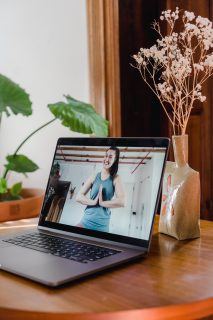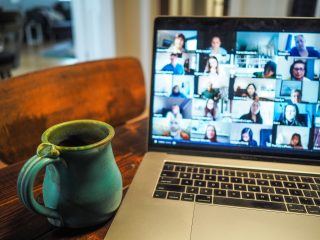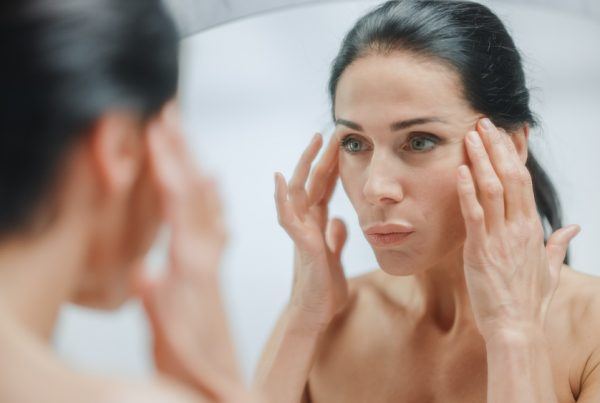Have my eyes always been that big? You can dig into my pores. This meeting has been going on for so long, they must have noticed how wide my nose is. Why has no one ever told me that my teeth are so crooked? While we were all focused on the physical toll of the coronavirus pandemic, we may have been oblivious to its broad mental toll.
For one, Zoom meetings were meant to keep us connected during hard lockdown days, but, it seems, they’ve had unintended consequences, affecting the way we see ourselves and the way we see our bodies. In extreme cases, this has led to body dysmorphic disorder (BDD).
What Is Body Dysmorphia?

Photo by Ivan Samkov from Pexels
Dr. Marilyn Davis-Shulman, a licensed clinical psychologist and trauma and addiction specialist, describes body dysmorphia as “a preoccupation with an imagined defect in appearance. If a slight physical anomaly is present, the person’s concern is markedly excessive.”
Now, while we may have become a bit concerned with our appearance, especially after not being able to interact with people for months on end, it doesn’t mean we have body dysmorphia.
According to Dr. Davis-Schulman, “individuals who fulfill the criteria for the diagnosis of BDD display behaviors, thoughts, and feelings which drive them to become preoccupied with repetitive, compulsive behaviors with regard to their appearance.”
Yet, if we spent the better half of 2020 in our pajamas and hidden from the world, how did we become so concerned with our appearance?
The Zoom Boom

Photo by Tim Samuel from Pexels
Yes, Zoom meetings have given us the opportunity to stay on top of our professional lives, while only having to dress from the waist up. But sadly, as much as we love our faces, staring at it for hours on end, day in and day out, is probably not the best thing for our self-image.
“While almost everyone has some degree of asymmetry on their face, it’s now more pronounced and accentuated, because video conferencing is a daily, if not hourly, occurrence,” says Dr. Elfrieda Fourie, a medical doctor specializing in advanced medical aesthetic procedures. “We’re constantly studying and analyzing our faces during virtual meetings, and the more we do, the more we’re noticing the asymmetries and imperfections, which are exaggerated, in high definition.”
Dr. Davis-Schulman adds that all those Zoom meetings aren’t only exacerbating existing body image issues, but they’ve led to the emergence of Zoom dysmorphia.
“Zoom dysmorphia is an altered or distorted negative perception of the individual’s appearance/body image that is a direct sequela of spending excessive time or most of the day on video calls.”
While you may have some qualms about how you look on camera, Zoom dysmorphia is “a more intense, preoccupied, obsessive response pertaining to facial features from the neck up, rather than appearance in general”, she says.
Now that restrictions have been lifted, and we’re once again interacting outside of Zoom meetings, why are we still self-conscious about our bodies?
Real vs ‘real’
It’s not just the camera on our laptop that is affecting our self-image. As fun as taking selfies can be, the images staring back at us may also be a reason why so many people are struggling with body image.
Dr. Vivian Jandera is a plastic surgeon and president of the Association of Plastic, Reconstructive, and Aesthetic Surgeons of South Africa (APRASA).
“People are comparing themselves to the curated, filtered images seen on social media, and this makes them feel inadequate,” she explains, adding that a forward-facing camera 30 cm away from your face distorts your appearance.
“Your nose appears up to 30% wider, your face looks rounder, your eyes look smaller and further apart, your forehead looks taller, and your ears seem to disappear. So, from this people get an idea about how they would like to appear before others, which is not an authentic issue.”
As such, it should come as no surprise to hear that the “Zoom boom” has also led to a boom in aesthetics and surgical treatments in the past year. In fact, a study published in the International Journal of Woman’s Dermatology found that zoom dysmorphia extends beyond the screen.
“We are definitely seeing an increase in requests for treatment of areas of the face that are visible on video conferencing platforms,” says Jandera.
Fourie adds that the eye area has received the most attention.
“Nowadays, our eyes and forehead areas are working overtime. When we’re at home, we’re squinting at the computer screen; when we’re out, the rest of our face is covered by a mask, and frown lines and crow’s feet are on full display.”
Doctors Have a Responsibility
But while many medical practitioners welcome a clientele that comes courtesy of the Zoom boom, they have a responsibility to their patients, notes Fourie.
“It’s our responsibility as aesthetic doctors to educate patients on the difference between fantasy and reality and to manage unrealistic expectations. It’s up to us to guide patients on what is needed to get the best result. That result should look naturally flawless – polished, and definitely not plastic.”
Navigating Our Virtual Insecurities

Photo by Chris Montgomery on Unsplash
Zoom meetings aren’t going anywhere – especially with more and more companies seeing the benefits of their employees working from home.
Jandera suggests the following non-invasive actions to make you feel better about how you look on screen:
- Use a ring light to optimize lighting.
- Raise your laptop so that your camera isn’t looking upwards to the ceiling.
- Put your camera further away from your face – this decreases the distortion of your features.
- If you’re really anxious, turn off your camera.
- If you find seeing your face in a meeting stressful, put a Stick It notes over your picture on the screen. This will help you to focus on the others in the meeting.
- Limit your time on social media.





![women [longevity live]](https://longevitylive.com/wp-content/uploads/2020/01/photo-of-women-walking-down-the-street-1116984-100x100.jpg)









